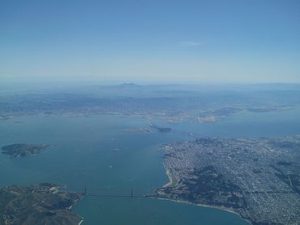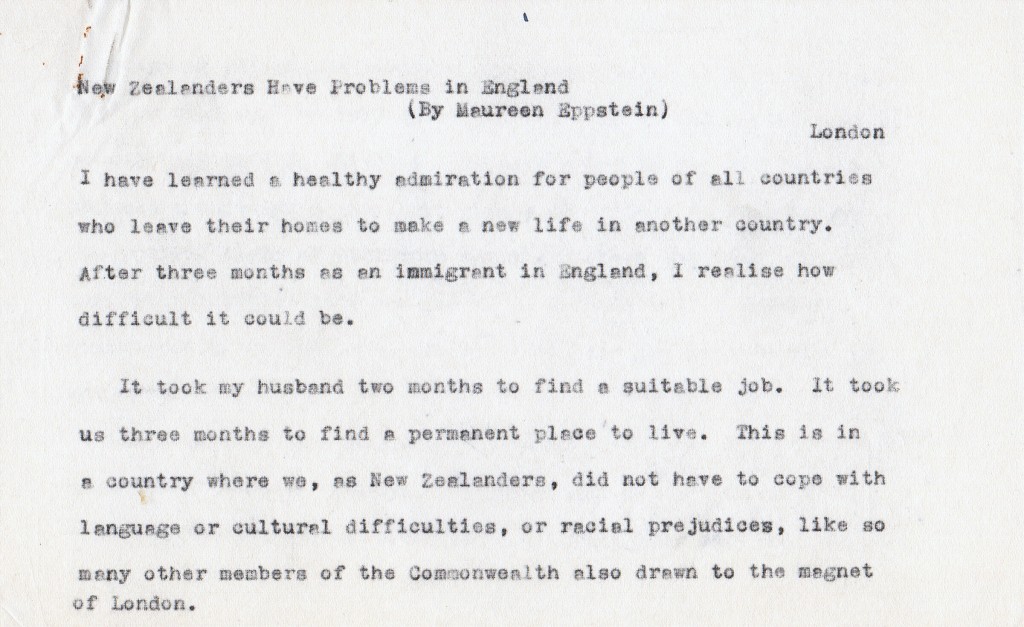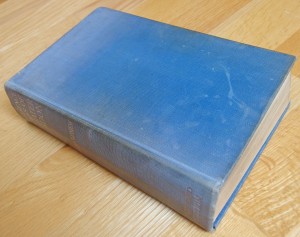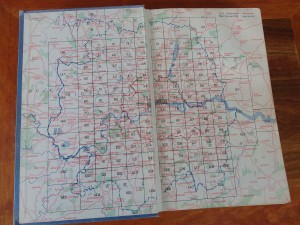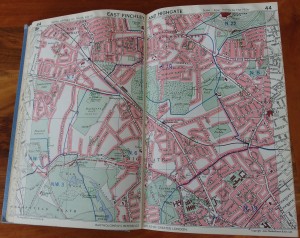Posts Tagged ‘immigration’
Immigrant arrival
According to archived weather records, the afternoon temperature at San Francisco Airport on Saturday May 20, 1967 hovered around seventy degrees. Fog had rolled in the previous night, but the mid-afternoon sky was clear, with visibility ten miles. As the British Airways plane dropped lower and lower over the waters of the bay, the surrounding hills became visible. Something about the quality of the light triggered a thought in my mind: this is the landscape of home.
It wasn’t the place where I grew up. Tauranga, New Zealand, is 6,500 miles southwest across the Pacific from California. But Tauranga’s distance from the equator, latitude 38 ? S, is the same as San Francisco’s to the north. The view from the air of San Francisco Bay and surrounding hills has similarities with Tauranga Harbour. Tauranga’s climate is subtropical and humid; it’s a rare day with no cloud in the sky. Even in the San Francisco Bay Area’s Mediterranean climate, with its clear summer skies, the ever-present offshore fogbank spreads a blue mistiness over the hills.
Part of the triggered thought was relief at finally coming back to terra firma. It had been a long flight, twelve hours over the pole from London. The journey had been made as comfortable as possible. The Silicon Valley company hiring my husband Tony had paid for first class tickets. The airline put us right up front, where there was plenty of legroom, and wall space to hook up a crib for our 18-month-old baby, who slept most of the way, sitting up occasionally to exclaim, “Airp’ane! Airp’ane!” The food was excellent, according to Tony. Our four-year-old son and I didn’t want to know. The two of us huddled together, miserable with airsickness.
Sight of the San Francisco Bay also signified something deeper: a recognition that this journey was the start of a new life. We were no longer in England, where the class system had us labeled as “colonials” and therefore outsiders. We were not heading back to our birth country, where the old baggage of family relationships and kiwi social assumptions would reassert their weight. We were free to find our own place in the rapidly growing, multi-cultural landscape of the exciting new high tech industry.
When we moved to England, we were unclear about how long we planned to stay. We stored boxes of belongings in New Zealand, as if we planned to return, and our mindset while we lived in England was that of visitor rather than permanent resident.
This move was different. We were immigrants, Resident Aliens in the terminology of our green cards. I knew there would be culture shock. I had experienced this phenomenon, unexpectedly, our first months in England. I had to drop all the slang I had grown up with, and was unsure how to correctly use English colloquial expressions. (Did to “go up to Oxford” mean to take the train from London or to attend the university? If the former, did one “go up” to other universities too?) This time I knew to expect that attitudes, ways of talking, and subtle social cues would be unfamiliar. Like caterpillars metamorphosing into butterflies, we would slowly take on the coloration of our new country.
Trudging through bureaucratic thickets: a visa saga
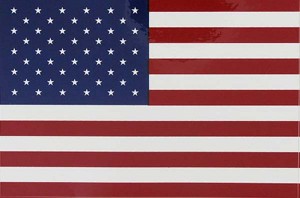 Having lived through the experience of applying for a United States immigrant visa, my heart goes out to those who recently trudged through the bureaucratic thickets, only to be turned away at airport gates by Trump’s anti-immigration order.
Having lived through the experience of applying for a United States immigrant visa, my heart goes out to those who recently trudged through the bureaucratic thickets, only to be turned away at airport gates by Trump’s anti-immigration order.
Every immigrant’s story is different, of course. But maybe telling our story, as documented by my letters to parents during that time, will offer some insight into the process which, even in 1966-67, and even with a US company going to bat for us, was exhausting and nerve-wracking.
Born in New Zealand, we were living in England, where my husband Tony designed and tested disk drives for the rapidly-growing computer industry. He interacted with people from US companies, several of whom had shown interest in offering him a position in the US, where skilled high tech workers were in short supply.
9 Aug. 66
p.s. Have you got my B.A. or M.A. certificate? If so, would you please send them airmail.
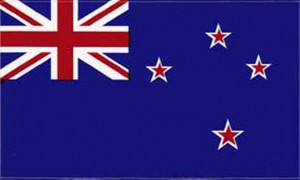 A complication was that when we left New Zealand in 1962, we boxed up belongings we didn’t think we needed to take and left them in a friend’s basement. Those friends sold their house and moved, sending the boxes to Tony’s mother, who sold her house and moved, sending them to my parents, who sold … By this time they were (we hoped) with my sister, Evelyn.
A complication was that when we left New Zealand in 1962, we boxed up belongings we didn’t think we needed to take and left them in a friend’s basement. Those friends sold their house and moved, sending the boxes to Tony’s mother, who sold her house and moved, sending them to my parents, who sold … By this time they were (we hoped) with my sister, Evelyn.
22 Aug. 66
Don’t bother any more about the degrees. …we are going to rely on a statement from the university registrar instead. It is for American visa – we need proof of special qualifications etc. to get onto special entry list. However, there is no hurry as yet, as American job is still a mirage on the horizon – needless to say we are both a bit edgy with all this uncertainty.
 An excellent job offer from a Silicon Valley company came through in early October, and we put our house on the market immediately.
An excellent job offer from a Silicon Valley company came through in early October, and we put our house on the market immediately.
17 Oct. 66
The property market is very depressed here at the moment … so we can only hope for the best.
We don’t expect to leave until after Christmas anyway. The visa will take quite a few weeks to come through, & Tony can’t give his month’s notice until he gets it.
… After so many months of waiting around, we are finding it hard to believe that it has actually happened.
31 Oct. 66
We had our first viewer for the house yesterday….
You may have heard that we have had a delay over visas – U.S. authorities have stuck over this question of Tony’s degree & they insist on the fancy bit of paper. I wrote to Evelyn last week, so hope she has managed to do something about looking for it. Could you find out how she is getting on? It is possible she may still be assuming that it is in a mailing tube – it ain’t necessarily so – it could be flat in an envelope – or anywhere. Another thought – has she got all our things, or has Mrs. L. still got some? It really is urgent that it be found.
Apart from these problems, things are going quite well. We had a note from the removal firm the other day asking when we wanted them to come in – it seems that everything will be packed for us, transported, & unpacked at the other end – unheard-of luxury!
 Having gone through every box, Evelyn finally found the degree certificate in a box labeled “Dining-room stuff.” She registered the package and mailed it with first class air mail postage.
Having gone through every box, Evelyn finally found the degree certificate in a box labeled “Dining-room stuff.” She registered the package and mailed it with first class air mail postage.
12 Nov. 66
I suppose you will have heard of the latest little crisis – bloody N.Z. Post Office managed to send the degrees by ship, due to reach us about Christmas! However, it mightn’t be disastrous. B.Sc. sent by Mrs. L did arrive safely, & the firm are cabling the university to send a duplicate of the degree. But it has got to the stage where I am beginning to wonder how much else can go wrong before we actually leave.
15 Dec. 66
…[Have] had another difficult week – actually, I had been putting off writing until we got our affairs a bit straighter. Anyway – on Monday we learned that the visa petition had not yet been filed – they are still waiting for the M.Sc. degree. The ship was supposed to berth yesterday, but as the mails are already in chaos with the Christmas rush, heaven knows when it will turn up. So, having found out where the petition had got to, we thought we might as well check up on the time scale from the embassy. Here we got a horrible shock – we were cheerfully informed that it was going to take five months from the time the thing was filed in San Francisco – don’t ask me how they manage to stretch the red tape that far – that’s just what they said. Contracts half-way through being signed for sale of house – still legally possible to back out – just – but very inconvenient for everybody else, so we are going on with sale, & still negotiating a deferment of the completion date. Even so, we will probably have to find somewhere else to live for a while, which is going to be a bit of a problem. Tony very depressed at the thought of staying at [his current job] for another six months, still waiting to hear whether California are prepared to wait that long.
30 Dec. 66
How up-to-date are you with our plans? The degree has been sent to America, we haven’t heard yet whether it & its associated papers have been presented to the authorities, we have until the middle of April to get out of the house, & the name of someone in the American embassy whom it is possible (possibly) to push to get a visa sooner, and at present are gathering together all the documents (in triplicate) we require, such as birth certificates, marriage certificate, photographs, etc.
18 Feb. 67
I forgot to tell Evelyn that we have received a letter of apology from the Postmaster-General, though no compensation – didn’t really expect it!
 Trying to get information about the status of our application proved almost impossible. Before 8:00 am, the phone at the US Embassy would ring and ring. From 8:00 am to 5:00 pm we’d get a busy signal. But finally, one day I got lucky.
Trying to get information about the status of our application proved almost impossible. Before 8:00 am, the phone at the US Embassy would ring and ring. From 8:00 am to 5:00 pm we’d get a busy signal. But finally, one day I got lucky.
28 Feb. 67
You’ll have to excuse me if my letters are a bit erratic in the next few weeks. We have to be out of the house in six weeks, and it is just possible that we may be leaving for America about then. The papers arrived from San Francisco last week. I don’t think I told you that we had the petition changed a few weeks ago, on the advice of the American consul in London. We had applied for 3rd preference – for those with degrees, etc., but the waiting list for this category goes back to last September for NZers – as there are only 100 immigrants a year total [from NZ] and 10% for this preference, this is not surprising. Anyway, he suggested trying for 6th preference – skilled workers not easily available in U.S., for which Tony, being an electronics engineer, would qualify, & for which there are places available now for NZers. So a frantic dash to London by me, to bring back yet another lot of forms to fill in. Can you remember all the addresses you’ve lived at since you were 16? …
15 Mar. 67
The petition has now gone for clearance to Wellington (checking up on our murky past). I don’t doubt there will be another delay, in which case we will have to move into a flat or something here. The estate agent who sold the house is looking for something for us, but I expect we shall have to pay through the nose for it.
 We were lucky to find a furnished flat. On April 14 packers moved in and packed our household goods for shipment to California. We took with us only the clothes for ourselves and the two children (ages three and one) that would fit into suitcases weighing under the economy class limit, and borrowed a few items from friends, such as a cot and stroller for the baby.
We were lucky to find a furnished flat. On April 14 packers moved in and packed our household goods for shipment to California. We took with us only the clothes for ourselves and the two children (ages three and one) that would fit into suitcases weighing under the economy class limit, and borrowed a few items from friends, such as a cot and stroller for the baby.
15 April 67
… The clearances have now arrived… Now we only need a quota number from Washington, a medical check & formal interview, and that is the lot. At least we have this place until the end of May, which gives us a breathing space.
1 May 67
Believe it or not, we now have immigrants’ visa to the United States. We spent all day at the Embassy today. Having got up about 5:30 in order to be there by 8:30 as instructed, eight hours of sitting around – though I must give them credit for having things reasonably well organised, considering the numbers of people they had to get through. We were through the whole rigmarole by about three o’clock, & they offered to post the visas out to us instead of making us wait around with the kids for another couple of hours while they finished the processing – offer gratefully accepted. Actually, the kids were extremely good, considering David’s boundless energy & Simon’s lack of sleep. We were well stocked up with sweets & biscuits & story books, & of course there were plenty of other children to play with…
We are booked to leave England on Sat. 20th May, flying direct to San Francisco over the pole.
 My letter of 18 May 67 speaks of farewell visits with many friends. At the last minute I learned that the company was flying us out first class, so I could have had more of the children’s gear with me for the last few weeks. But that was a minor irritation compared with the relief of having the ordeal over with, and gratitude that the Californian company kept the job open for Tony all those months. I wish all today’s visa-holding immigrants and visitors could have an equally happy ending to their story.
My letter of 18 May 67 speaks of farewell visits with many friends. At the last minute I learned that the company was flying us out first class, so I could have had more of the children’s gear with me for the last few weeks. But that was a minor irritation compared with the relief of having the ordeal over with, and gratitude that the Californian company kept the job open for Tony all those months. I wish all today’s visa-holding immigrants and visitors could have an equally happy ending to their story.
Droplets in an immigrant wave
In a 1962 article I wrote for my old paper, the Christchurch (NZ) Press, a draft of which I found in my old black filing cabinet, I wrote:
I have learned a healthy admiration for people of all countries who leave their homes to make a new life in another country. After three months as an immigrant in England, I realize how difficult it could be.
It took my husband two months to find a suitable job. It took us three months to find a permanent place to live. This is in a country where we, as New Zealanders, did not have to cope with language or cultural difficulties, or racial prejudice, like so many other members of the Commonwealth also drawn to the magnet of London.
We had no idea at the time of the hugeness of the immigration wave in which we floundered. To aid in post-war reconstruction in the 1950s, Britain had recruited labor from its colonies, primarily the West Indies and the Indian sub-continent. At that time people from the Empire and Commonwealth had unhindered rights to enter Britain. However, by the late 1950s, with the British economy faltering, racial prejudice reared its violent head. The Conservative Party government proposed legislation to make immigration for non-white people harder. One aspect of the proposed bill was to deny entry to dependents of immigrant workers. Before the Commonwealth Immigrants Act of 1962 could go into effect, the entry of dependents into Britain increased almost threefold as families attempted to beat the deadline. Total immigration from what was known as the New Commonwealth swelled from 21,550 in 1959 to 58,300 in 1960 and a record 125,000 in 1961.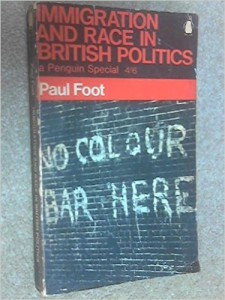
Statistics are from Paul Foot, Immigration and Race in British Politics (Penguin, 1965)
All these people needed somewhere to live. It is no wonder then that rents soared and accommodations of any sort were snapped up. While Tony job-hunted, I haunted rental agencies for a short-term apartment (or flat, as they’re called in England) and, the hefty Bartholomews Atlas of Greater London under my arm, braved the Underground and navigated the suburbs. My letters to parents are full of observations like this one:
It’s amazing how so many of the little villages that have been absorbed into the city still retain their village atmosphere – you pop up from an Underground station and could imagine yourself miles out in the country – unless you happen to be on a bit of a rise, when you see nothing but houses as far as the eye can see. One place I visited, for instance, Muswell Hill, you had to go by bus through a very extensive patch of woodland to get to it. That place I didn’t take, incidentally, because the bath was in the kitchen – covered by a lift-up board and a little frilly curtain. When I mentioned this to another English landlady she didn’t even raise an eyebrow.
My letter continues:
We have now moved out of our hotel into a bedsitter out at Hampstead, for which we are being grossly overcharged – I guess we just took it in a moment of desperation.
The rent was six and a half guineas a week (the same buying power as about $200 in current U.S. dollars.) Every piece of furniture was shaky about the legs, and the cooking facilities were two gas rings crammed into a cupboard with about six inches of counter surface. The shared bathroom was down the shabby hall. I described the landlady as
a bit of a social type – she was too busy preparing for her cocktail party last night to attend to our wants, which brassed me off considerably. Still we get on quite well with her little dog, so with a little careful handling relations might improve.
Relations did not improve. Still vivid in my mind is one of our shouting matches. I had returned from the local laundrette with clothes still damp, in spite of multiple coin feeds to the drier, and had strung clothesline around the room. In walked Mrs. Ashley-Davis. “My furniture! My furniture!” she wailed, hand to her heart. Other disputes must have followed. In a letter to parents dated May 25, after giving the news that Tony had accepted a job near Windsor, I mention that we have given notice
…after some somewhat violent disputes with the landlady, in which I managed to lose my temper – catastrophe!
Finding permanent housing proved even more frustrating. I told my parents:
…for the last three or four days we have been footslogging, railriding, bussing, and generally getting fed up in a wide arc around the area…
We moved out to a hotel near Tony’s new job. My letters for the next few weeks are full of the false hopes and discouragements of the search. Finally we got lucky: a second floor flat in a Victorian brick semi-detached house just down the hill from Windsor Castle. A roof over our heads at last!
Here’s a modern Google Maps street view of the neighborhood. It still looks much the same.
